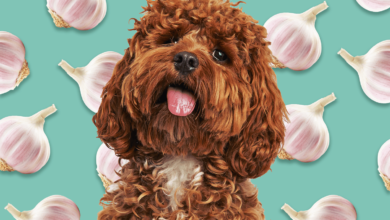
Can Dogs Eat Teriyaki Sauce? The Risks You Should Know- Teriyaki sauce contains toxic ingredients like garlic and onion, which can cause severe health issues for dogs. These ingredients can lead to poisoning and other dangerous reactions.
The high sodium levels in teriyaki sauce can also cause dehydration, kidney strain, and even salt poisoning. Additionally, the added sugar can contribute to obesity, digestive problems, and diabetes. In this article, we’ll dive into these risks and why it’s important to avoid giving your dog teriyaki sauce.So, let’s briefly discuss that- Can Dogs Eat Teriyaki Sauce?
Why Dogs Should Avoid Teriyaki Sauce
Teriyaki sauce may seem like a tasty addition to your meals, but it contains several ingredients that are harmful to dogs. Here’s why you should avoid giving your dog teriyaki sauce:
1. Garlic and Onion Toxicity
- Health Impact: Both garlic and onion, even in small amounts, are highly toxic to dogs. They can damage a dog’s red blood cells, leading to anemia, lethargy, and vomiting.
- Long-Term Risks: Repeated exposure to garlic and onion can result in more severe health issues, including long-term damage to the dog’s blood cells.
2. Sodium Overload
- Kidney Strain: Teriyaki sauce is packed with salt, which can cause sodium toxicity in dogs. Excessive sodium can lead to symptoms like vomiting, tremors, and seizures.
- Dehydration: High sodium content can also cause dehydration and put a strain on the kidneys, especially in dogs with pre existing kidney issues.
3. Digestive Distress
- Upset Stomach: The sugars and sweeteners in teriyaki sauce can lead to digestive problems in dogs, including bloating, diarrhea, and discomfort.
- Obesity Risk: Regular consumption of sugary foods can contribute to weight gain and increase the risk of obesity and diabetes over time.
To keep your dog safe and healthy, it’s best to avoid giving them teriyaki sauce and stick to dog-safe foods and treats.
Signs Your Dog Has Consumed Teriyaki Sauce
If your dog has eaten teriyaki sauce, it’s important to monitor for any signs of distress. Here’s what to look out for:
1. Gastrointestinal Issues
- Vomiting: Your dog may vomit due to the high sugar and salt content in the sauce.
- Diarrhea: Upset stomach from ingredients like sugar and sweeteners can lead to diarrhea.
- Excessive Drooling: A sign of nausea or irritation caused by toxic ingredients in the sauce.
2. Lethargy and Weakness
- Tiredness: Garlic and onion toxicity can make your dog feel unusually tired or weak.
- Difficulty Moving: Your dog may show signs of muscle weakness or lack of coordination, especially if garlic or onion was consumed.
3. Severe Reactions
- Tremors: High sodium levels can lead to muscle tremors or shaking.
- Seizures: In extreme cases, sodium poisoning may cause seizures or other neurological symptoms.
- Collapse: A serious sign of salt poisoning, which can be life-threatening and requires immediate veterinary attention.
If you notice any of these symptoms, contact your veterinarian or an emergency pet poison hotline right away for assistance.
What to Do If Your Dog Eats Teriyaki Sauce
If your dog consumes teriyaki sauce, it’s essential to take immediate action to ensure their safety. Here’s a step-by-step guide:
1. Monitor for Symptoms
- Observe for Signs of Poisoning: Watch your dog closely for symptoms like vomiting, diarrhea, drooling, lethargy, or tremors. These could be signs of toxicity.
- Assess the Amount Consumed: Try to determine how much teriyaki sauce your dog ingested, as this will help your veterinarian assess the severity of the situation.
2. Call the Vet
- Contact Your Veterinarian: If your dog shows any signs of distress or if you’re unsure about the seriousness of the situation, contact your veterinarian immediately for advice.
- Pet Poison Hotline: You can also call a pet poison hotline for professional guidance, especially if it’s after hours or if you’re unsure what to do.
3. Offer Water
- Encourage Hydration: High sodium content in teriyaki sauce can lead to dehydration. Offer your dog fresh water to help flush out the excess salt and support their kidneys.
- Keep Water Available: Ensure your dog has access to fresh water at all times while monitoring for any further symptoms.
Taking these steps can help mitigate the effects of teriyaki sauce consumption and prevent further complications. Always seek professional advice to ensure your dog’s health and safety.
Healthy Alternatives to Teriyaki Sauce for Your Dog
If you’re looking to add some flavor to your dog’s meals without the risks of teriyaki sauce, there are several safe and healthy alternatives to consider:
1. Plain, Unseasoned Meat
- Healthy Snack Option: Offer your dog simple, cooked meat like chicken, turkey, or beef. These meats are a great source of protein and free from harmful seasonings like garlic, onion, or salt.
- Easy to Prepare: Just cook the meat thoroughly and avoid adding any spices, oils, or sauces.
2. Dog-Friendly Sauces
- Homemade Broths: Make your own low-sodium broth by simmering meat (without added seasonings) in water. This adds moisture and flavor to your dog’s food.
- Pureed Vegetables: You can also blend dog-safe vegetables like pumpkin, sweet potatoes, or carrots to create a healthy, flavorful topping for their meals.
- Unsalted Broth: If you prefer something quick, use unsalted chicken or beef broth in small amounts to enhance flavor without the risk of added sodium.
3. Natural Treats
- Choose Healthy Snacks: Look for dog treats that are free from harmful additives like garlic, onion, or excess sugar. Opt for treats that are low in sodium and tailored to support your dog’s health.
- Whole Foods: You can also use small portions of dog-friendly fruits and vegetables, such as apple slices or baby carrots, as healthy alternatives to flavored sauces.
By choosing these healthy alternatives, you can safely enhance your dog’s meals without compromising their well-being. Always remember to check labels and avoid ingredients that may be harmful to your furry friend.
Tips for Keeping Your Dog Healthy and Safe
Ensuring your dog’s health and safety requires careful attention to their diet, hydration, and overall well-being. Here are some tips to help you keep your dog healthy and safe:
1. Avoid Harmful Foods
- Stick to Dog-Specific Diet: Provide food specifically formulated for dogs, as it’s designed to meet their nutritional needs. Avoid feeding them human foods, especially those that may contain toxic ingredients such as garlic, onion, chocolate, grapes, raisins, and xylitol (found in sugar-free products).
- Be Cautious with Treats: Always check ingredients for harmful additives or preservatives that could upset your dog’s stomach or cause more serious health issues.
2. Offer Fresh Water
- Hydration is Key: Always provide access to fresh, clean water to help keep your dog hydrated. Proper hydration supports kidney health, aids digestion, and helps regulate their body temperature.
- Monitor Water Intake: Ensure your dog is drinking enough water, especially if they’ve consumed salty or processed foods that can lead to dehydration.
3. Consult Your Vet Regularly
- Routine Check-Ups: Regular visits to the vet are essential for maintaining your dog’s health. Your veterinarian can identify potential health issues early and provide advice on diet, exercise, and overall care.
- Health Screenings: Regular screenings and preventive care help ensure your dog is free from parasites, infections, and nutritional deficiencies.
By following these tips, you can help ensure that your dog stays happy, healthy, and safe from the dangers of harmful foods and other potential risks. Always be proactive about their health and well-being!



